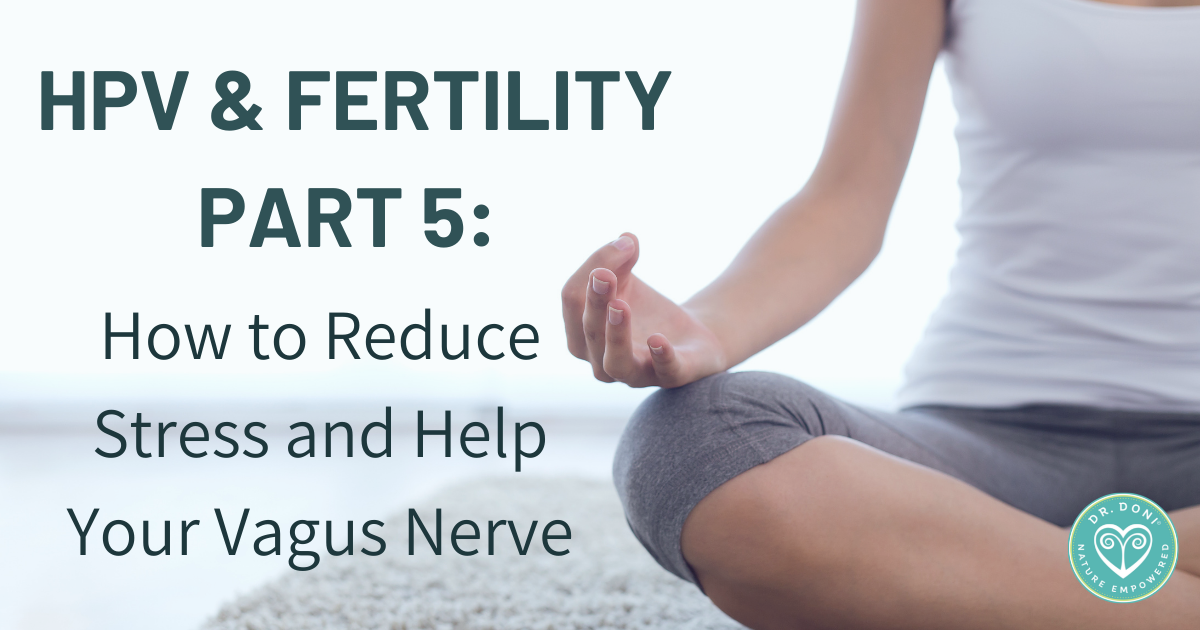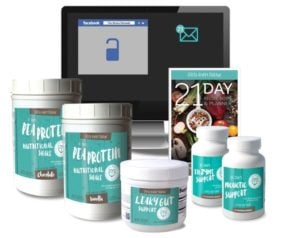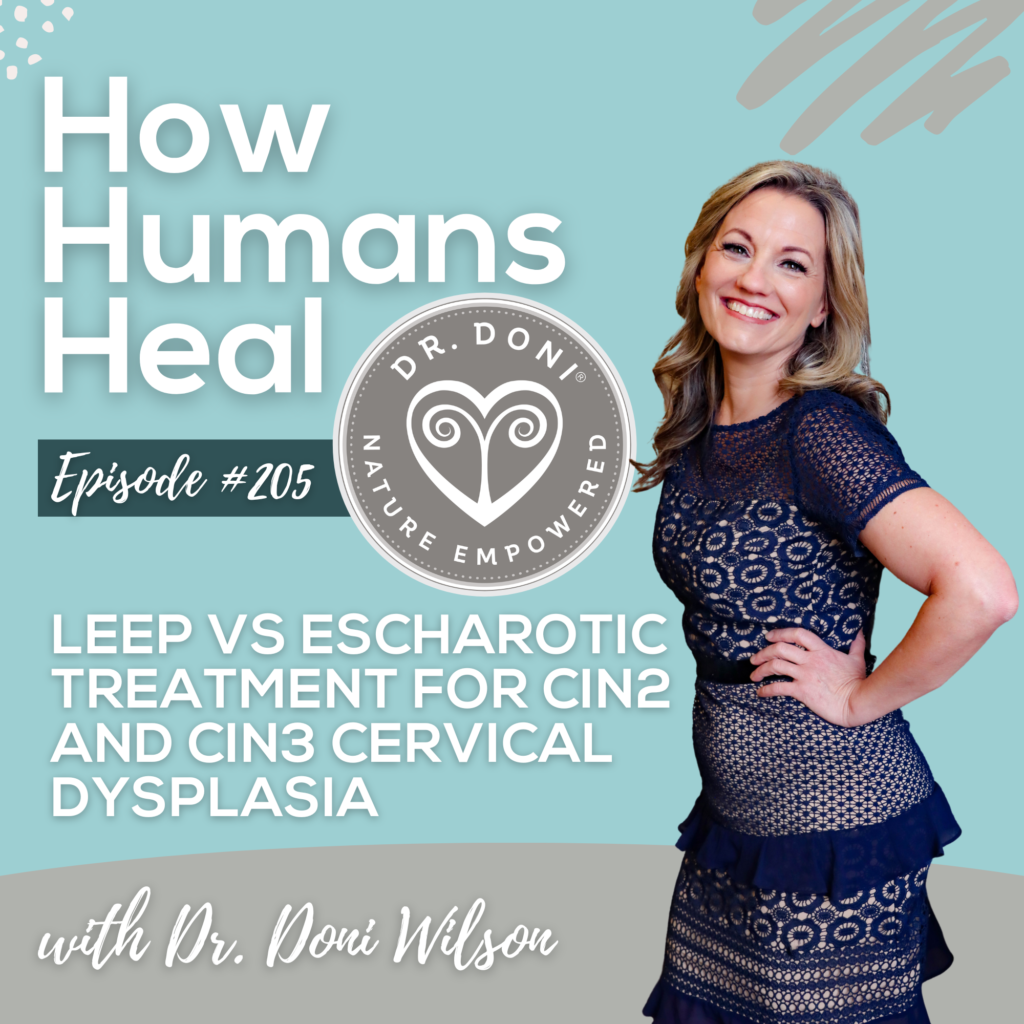
HPV and Fertility Part 5: How to Reduce Stress and Help Your Vagus Nerve
- Home
- Abnormal Pap & HPV
- HPV and Fertility Part 5: How to Reduce Stress and Help Your Vagus Nerve

Using easy yet effective strategies to reduce stress can improve “vagal tone.” This is absolutely key for keeping HPV activity at bay and helping you have a healthy pregnancy as well.
Part 5 of Dr. Doni’s Series on HPV & Fertility
I define stress as “anything that challenges the body.” Strengthening the vagus nerve by improving “vagal tone” can help the body deal and heal from those stressors, including factors that may contribute to HPV activity and challenges with fertility as well!
HPV and Fertility: What Role Does Your Vagus Nerve Play?
The vagus nerve is the longest nerve in the body and is often referred to as the main “neural highway.” As part of the autonomic nervous system, its main job is to send signals from the brain to the internal organs (and back to the brain) in response to stress. Have you ever felt that “punched in the stomach” feeling when hearing devastating news? This is because of the vagus nerve!
In Part Three of this series, you learned that it is not just what you eat but how you eat that can affect your health. When you eat while under stress, the vagus nerve sends signals to the body to go into “stress mode.” This can bring digestion to a halt. When you eat in a calm state, the vagus nerve signals your GI tract to go into “rest and digest mode.” Here, proper absorption of nutrients can occur.
“Vagal tone” is measured by how responsive your vagal nerve is to stress. Good vagal tone is associated with lowering blood pressure, balanced mood, and digestive ease. It is also associated with lower systemic inflammation, lower cortisol levels, and more effective cellular communication between the brain and the gut.
On the other hand, poor vagal tone is associated with many kinds of digestive issues, frequent infections, autoimmunity, anxiety, as well as chronic fatigue syndrome. Poor vagal tone is also correlated with low fertility and HPV. This is because it can have an effect on ovary function and hormonal levels.
Vagal tone can be influenced negatively by chronic stress, high toxin exposure, and a high viral load. A 2013 investigation conducted at Tufts University in Boston found that many kinds of viral infections tend to lodge around the vagus nerve.
8 Simple Things You Can Do NOW To Increase Vagal Tone and Reduce Stress at the Same Time!
One of the keys to healing HPV and increasing fertility is lowering stress by upping your vagal tone. How can you do that? The following 8 tips can show you how.
#1 Deep Breathing
Deep breathing is a simple yet profound way to reduce stress. When you take deep breaths, you are signaling to your body that you are no longer in the “stress response.” With this cue, your vagus nerve sends the message to the organs that it is time to “rest and digest.” A 2007 investigation at the University of Bergen in Norway found that breathing exercises helped patients with recurring indigestion because of what the techniques were doing to improve vagal tone.
In addition to digestion, deep breathing helps reduce oxidative stress since you are consciously breathing out toxins while breathing in healing oxygen. Finally, deep breathing helps you refocus your mind. As you breathe, you move away from all those stressful thoughts in order to focus on your body. Two apps I recommend are Breathe2Relax and Breathe Well.
#2 Biofeedback
Biofeedback is a natural health modality that allows you to learn to support your vagal nerve to control bodily functions and sensations such as muscle tension and pain. During a typical biofeedback session, you are connected to non-invasive electrodes that give you information about your body so you can monitor your progress.
Through focused attention and breathing techniques, you learn how to make subtle changes in body behaviors such as lowering heart rate or warming up cold fingers. That’s because the vagus nerve communicates with the heart. In fact, with biofeedback, we can monitor “Heart Rate Variability” (HRV), which is a way to assess vagal tone.
When your body is able to easily shift from the parasympathetic (rest and digest) and sympathetic (fight or flight) branches of the autonomic nervous system (ANS), it shows up in your HRV. HRV is a “key indicator of physiological resiliency and behavioral flexibility,” according to researchers at the HeartMath Institute. Biofeedback allows you to optimize your HRV and increase oxytocin, which is often called the “love and connection hormone.”
You can find out more about HeartMath’s Inner Balance HRV sensor and app HERE. I’m trained in HeartMath biofeedback and I’ll happy to guide you!
#3 Meditation and Mindfulness
Meditation and mindfulness are also effective ways to reduce stress, improving the immune system, and rebalancing hormones through improving vagal tone. A simple way of practicing mindfulness is to take a few minutes each day to focus on one thing. This is easy to do several times a day since you can do it at the same time that you are completing tasks at work or at home.
You can also stop what you are doing and take 10 minutes or so to focus on breathing or on a “mantra” only. When your thoughts wander (and they inevitably will), gently bring your attention back to the breath or the mantra. A 2017 report published in the Journal of Religion and Health found that college students who practiced mantra meditation displayed “clear improvement in general cheerfulness and clarity of mind” after a set period of time. Other studies have shown that just 1 hour of meditation per week can improve sleep and reduce stress after 3 months of practice. Not only that, but it increases neuroplasticity – allowing us to build new neuropathways and not only recover from stress, but to reduce stress in the future.
Meditation and mindfulness don’t have to involve sitting and staring at a blank wall. Doing something as simple as petting a cat or dog can be an act of mindfulness. This is actually how I like to enjoy these practices, especially with our dog Aphrodite.
Some resources I recommend to help you with meditation and mindfulness include Ziva Meditation, created by meditation-for- performance expert Emily Fletcher, as well as the delightful “mini-book” Happiness Through Meditation by Dr. Paul Epstein. I also highly recommend Dr. Joe Dispenza if you’d like to take your meditation practice to the level of quantum shifts and distance healing (which I’ve done).
#4 Time in Nature
Simply being in nature is one of the most effective ways to reduces stress. Dozens of studies have confirmed this. I love using nature for stress relief because it is so easy (and, yes, so natural) to us as humans. All we have to do is allow our eyes to rest on a tree or the ocean. We can utilize other modalities as well. Mindfulness (i.e. listening to the sounds around you) is one such way. Or exercise as well (i.e. going for a brisk walk while you are at the park).
Many studies have found that when we view a natural setting, hormones become more balanced, our energetic field optimizes, and digestion improves.
Can being in nature improve your chances of getting pregnant and keeping HPV at bay? You bet! One study at the Norwegian Institute of Public Health found that women suffering from chronic stress had improved tolerance to pain and increased mood when exposed to images of nature, especially flowers. If you need an excuse to treat yourself to a vase of daffodils or pink roses for your home or office on a regular basis, now you have one!
#5 Listening to Music, Playing Instruments, and Singing
Speaking of frequency, simply listening to music can help reduce stress responses. Recent studies have found that when individuals listened to relaxing music after a stressful event, levels of cortisol, as well as other stress markers, fell considerable. The ear is considered a “parasympathetic regulatory organ.” Stimulating the ear through healing and/or uplifting sounds also stimulates the vagus nerve. This can have an effect on all of the internal organs it reaches.
Playing an instrument or singing can also have a beneficial effect on stress and soothe the vagus nerve. Some of the instruments used in music therapy include tuning forks, pan flutes, harps, drums, and singing bowls.
Singing can be especially healing for the thyroid. When your thyroid is working properly, your whole endocrine system has the chance to get back online. The vagal nerve influences the vasculature of the thyroid gland as well.
Finally, laughing (which can be thought of loosely as a form of singing) can be just as healing. This is the premise of “laughter yoga,” created by Dr. Madan Kataria and brought to the west roughly two decades ago. Currently, there are over 20,000 free social Laughter clubs in over 110 countries and a hefty amount of research behind its effectiveness as well. For more information, check out Dr. Kataria’s Laughter Club International website.
#6 Helminthic Therapy
Helminthic therapy is the use of specific types of microbes to aid in the treatment of autoimmunity, allergies, inflammation, and infections – all of which are related to the vagal nerve.
Believe it or not, helminthic therapy has a solid history of success behind it. I know this from personal experience. I gave myself one dose per week and when I had some bloodwork done on the sixth week, I was pleasantly surprised. There was a significant increase in white blood cells. This was an indicators that the hookworms were doing their job, boosting and balancing my immune system. After two months (and an increase in dosage), I noticed a vast improvement in my allergy symptoms and nervous system. I was able to clean my house without the usual reaction and also eat a small amount of gluten. Yay!
According to research (and now personal experience), helminths are able to send signals throughout the body to balance our immune systems, lower inflammation, fend off infections, and even rebalance the diversity of bacteria living in our intestines. They are able to help reverse HPV as well as issues that often affect fertility.
These microbes are able to help us to recover our bodies after chronic stress as well as “turn off” certain key predispositions at the genetic level. For more information, check out this article.
#7 Cold Water Therapy
Coldwater therapy is part of a larger modality called cryotherapy, or the use of extreme cold for healing.
How cryotherapy works is pretty simple. Think of the last time you sprained your ankle or twisted a wrist. Odds are you probably put an ice pack on it right away. This is a localized version of cold therapy. The cold substance affected the “stressed” part of the body by constricting blood vessels. This caused inflammation to go down and pain to lessen.
Whole-body cryotherapy involves total submersion in a pool of extremely cold air for typically no more than 4 minutes. While it may seem drastic, there is hard evidence that cryotherapy can help to boost immunity in some individuals. A 2012 analysis put out by the University of Milan in Italy found that cryotherapy can produce an increase in interleukin-10, an anti-inflammatory cytokine.
Many people may not resonate with such harsh measures but may find benefits in milder forms of cold therapy. One small but impressive Finish study found that fight-or-flight responses declined and vagus nerve-regulated functions improved when participants were exposed to temperatures that were mildly cold, around 50 F.
An easy hot-cold therapy you can do in your own shower is to simply turn the cold on (as cold as you can stand it) and submerge yourself under the showerhead for up to a minute. You can then turn the warm/hot water on again for a few minutes. Be sure to end with cold, or go swimming in a cool lake or the ocean if you can, which is what I prefer.
#8 Deep Trauma Work
Finally, unresolved trauma and post-traumatic stress disorder (PTSD) can keep you in the cycle of stress for years, even after you have done other things to help. Over time, this can wear out the adrenals, affect the nervous system, and create low vagal tone. Most importantly, the trauma that remains “stuck” in the body can make it hard to regulate both hormones and the immune system, leading to high viral load (including HPV) and ongoing fertility challenges.
PTSD was once thought of as something that mainly affected first responders and combat soldiers. Now we know that a whopping 70% of American adults have suffered from some form of trauma during the course of their lives. Up to 20% are currently living with PTSD. In the 1980s, Dr. Vincent Felitti, director of the Department of Preventative Medicine at Kaiser-Permanente in San Diego, California, and his team conducted the Center for Disease Control-Adverse Childhood Experiences (CDC-ACE) survey. They found that 87% of the 17,000 survey participants had experienced some kind of childhood trauma (which they grouped into 10 different categories). They also found strong correlations between childhood trauma, prison time, work absenteeism, obesity, and chronic disease. You can learn more and download the ACE questionnaire HERE.
Happily, there is a lot that you can do to heal deep-seated trauma and PTSD. From EMDR to HeartMath biofeedback, to Emotional Freedom Technique (EMF, or “tapping”), to Post Betrayal Recovery, to various types of energy healing and working with a shaman, if you are suffering from the symptoms of PTSD, there is a modality for you. Plant medicines and other psychedelic substances (when micro-dosed or taken under the supervision of a qualified individual), can also be helpful for trauma processing and are becoming more accepted, including in the US.
You may also consider signing up for a Health Breakthrough Session with me. Using my 3-Step Stress Recovery Method, we get to the bottom of the symptoms you may be having, both emotionally and physically, and come up with a protocol and a plan that is designed uniquely for you.
Reduce Stress to Up Your Health on All Levels
I hope now you can see how helping your vagus nerve and lowering stress can significantly help you on all levels, including keeping HPV at bay and increasing fertility.
What’s more, taking care of your vagus nerve also means putting into practice modalities that take care of YOU on all levels, physically, emotionally, mentally, and even spiritually.
 To get the support you need to set your stress levels straight for better health, be sure to check out my 21-Day Stress Remedy Program. You can start by doing the 7-day Stress Reset for free.
To get the support you need to set your stress levels straight for better health, be sure to check out my 21-Day Stress Remedy Program. You can start by doing the 7-day Stress Reset for free.
 In addition, tune in to my free HPV Masterclass, “What Your Doctor May Not Be Telling You About HPV,” to learn more. This information-packed online class will help you to understand your pap results and will present a unique and effective way to address HPV using my proven protocols.
In addition, tune in to my free HPV Masterclass, “What Your Doctor May Not Be Telling You About HPV,” to learn more. This information-packed online class will help you to understand your pap results and will present a unique and effective way to address HPV using my proven protocols.
–Dr. Doni
12th May 2021
P. S. Join the HPV Healing Resource (Private Facebook Group)
This group is to support you on your path of healing and creating a life without HPV. It is led by Dr. Doni Wilson N.D., who has been helping women with HPV and abnormal pap results for over 22 years. It is a private group, only members can see who’s in the group and what they post. Click here to join.
IMPORTANT: If you are pregnant or breastfeeding, please keep in mind that it’s NOT the time to emphasize detoxification because it can be harmful to baby. Eating healthy, avoiding food allergens, and supporting healthy digestion are generally okay. It’s best to meet with your naturopathic practitioner to modify your approach during pregnancy and breastfeeding.
Share this Post:
Dr. Doni Wilson's Team
14 Day Detox Program
Take the Stress Type Quiz
Dr. Doni Social Media
Popular Posts


The 5 Burnout Types

Healing HPV Holistically: Dr. Doni on the Inspire Health by Jen Podcast

Recent Podcasts
Signup to receive our weekly newsletter with all the latest news, podcasts and special offers
New Book - Order Today!

SIMPLE PRACTICES for SHIFTING FROM YOUR STATE of STRESS to YOUR FLOW and FREEDOM
MASTER YOUR STRESS
RESET YOUR HEALTH
Order Now! Related Posts

What is making you susceptible to HPV?
I have been working with women who had abnormal cells on their cervix and/or vaginally, caused by HPV for over 20 years now. And while

The 5 Burnout Types
Did you know there are 5 burnout types? They are based on your Stress Type®, which is how your adrenal function has been affected by

Healing HPV Holistically: Dr. Doni on the Inspire Health by Jen Podcast
Dr. Doni was interviewed by Jen Ciszewski on the Inspire Health by Jen Podcast, talking about how to heal away HPV from your body for good.

Stress and Trauma: The Science Behind It, How It Shows Up and How to Heal: Dr. Doni on The Burn Fat and FEAST Podcast
Dr. Doni was interviewed by Sarah B. Thomas on the Burn Fat and FEAST Podcast, talking about the impact of stress and trauma on our health and what to do to recover from them.














